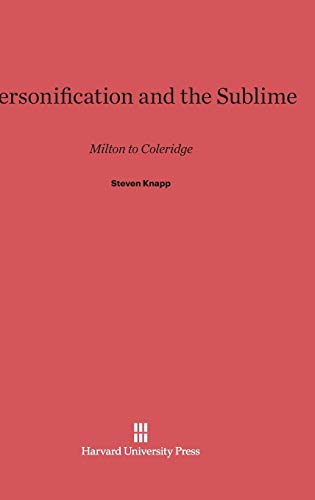
Reseña del editor
Eighteenth-century and Romantic readers had a peculiar habit of calling personified abstractions "sublime." This has always seemed mysterious, since the same readers so often expressed a feeling that there was something wrong with turning ideas into people--or, worse, turning people into ideas. In this wide-ranging, carefully argued study, Steven Knapp explains the connection between personification and the aesthetics of the sublime.
Personifications, such as Milton's controversial figures of Sin and Death in Paradise Lost, were seen to embody a unique combination of imaginative power and overt fictionality, and these, Knapp shows, were exactly the conflicting requirements of the sublime in general. He argues that the uneasiness readers felt toward sublime personifications was symptomatic of broader ambivalences toward archaic beliefs, political and religious violence, and poetic fiction as such.
Drawing on recent interpretations of Romanticism, allegory, and the sublime, Knapp provides important new readings of Coleridge, Wordsworth, Kant, and William Collins. His provocative thesis sheds new light on the relationship between Romanticism and the eighteenth century.
„Über diesen Titel“ kann sich auf eine andere Ausgabe dieses Titels beziehen.
Weitere beliebte Ausgaben desselben Titels
Suchergebnisse für Personification and the Sublime: Milton to Coleridge
Personification and the Sublime
Anbieter: BuchWeltWeit Ludwig Meier e.K., Bergisch Gladbach, Deutschland
Buch. Zustand: Neu. This item is printed on demand - it takes 3-4 days longer - Neuware -Eighteenth-century and Romantic readers had a peculiar habit of calling personified abstractions 'sublime.' This has always seemed mysterious, since the same readers so often expressed a feeling that there was something wrong with turning ideas into people--or, worse, turning people into ideas. In this wide-ranging, carefully argued study, Knapp explains the connection between personification and the aesthetics of the sublime. 192 pp. Englisch. Bestandsnummer des Verkäufers 9780674181663
Neu kaufen
Anzahl: 2 verfügbar
Personification and the Sublime
Print-on-DemandAnbieter: moluna, Greven, Deutschland
Gebunden. Zustand: New. Dieser Artikel ist ein Print on Demand Artikel und wird nach Ihrer Bestellung fuer Sie gedruckt. Eighteenth-century and Romantic readers had a peculiar habit of calling personified abstractions sublime. This has always seemed mysterious, since the same readers so often expressed a feeling that there was something wrong with turning ideas into peo. Bestandsnummer des Verkäufers 5943410
Neu kaufen
Anzahl: Mehr als 20 verfügbar
Personification and the Sublime
Anbieter: buchversandmimpf2000, Emtmannsberg, BAYE, Deutschland
Buch. Zustand: Neu. Neuware -Eighteenth-century and Romantic readers had a peculiar habit of calling personified abstractions 'sublime.' This has always seemed mysterious, since the same readers so often expressed a feeling that there was something wrong with turning ideas into people--or, worse, turning people into ideas. In this wide-ranging, carefully argued study, Knapp explains the connection between personification and the aesthetics of the sublime. 192 pp. Englisch. Bestandsnummer des Verkäufers 9780674181663
Neu kaufen
Anzahl: 2 verfügbar
Personification and the Sublime : Milton to Coleridge
Print-on-DemandAnbieter: AHA-BUCH GmbH, Einbeck, Deutschland
Buch. Zustand: Neu. nach der Bestellung gedruckt Neuware - Printed after ordering - Eighteenth-century and Romantic readers had a peculiar habit of calling personified abstractions 'sublime.' This has always seemed mysterious, since the same readers so often expressed a feeling that there was something wrong with turning ideas into people--or, worse, turning people into ideas. In this wide-ranging, carefully argued study, Steven Knapp explains the connection between personification and the aesthetics of the sublime. Personifications, such as Milton's controversial figures of Sin and Death in Paradise Lost, were seen to embody a unique combination of imaginative power and overt fictionality, and these, Knapp shows, were exactly the conflicting requirements of the sublime in general. He argues that the uneasiness readers felt toward sublime personifications was symptomatic of broader ambivalences toward archaic beliefs, political and religious violence, and poetic fiction as such. Drawing on recent interpretations of Romanticism, allegory, and the sublime, Knapp provides important new readings of Coleridge, Wordsworth, Kant, and William Collins. His provocative thesis sheds new light on the relationship between Romanticism and the eighteenth century. Bestandsnummer des Verkäufers 9780674181663
Neu kaufen
Anzahl: 1 verfügbar

